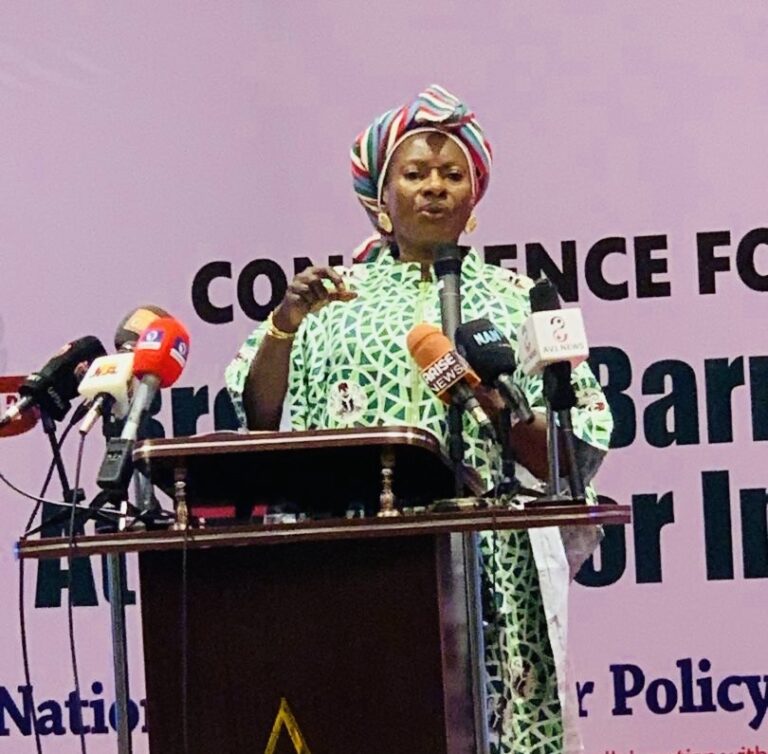News Investigators/ Former Minister of Women Affairs, Pauline Tallen, has called on Nigeria’s political parties to amend their constitutions and mandatorily allocate 50 per cent of appointments and elective positions to women.
Mrs Tallen made the appeal while delivering a keynote address at a two-day capacity-building conference organised by the National Institute for Policy and Strategic Studies (NIPSS) and Inter-Party Advisory Council (IPAC) on Wednesday in Abuja.
Speaking on the conference theme: “Breaking the Barriers and Shaping Positive Attitudes Towards Inclusive Politics in Nigeria,” she suggested the adoption of “Zebra Policy or 50-50” pairing of male and females.
Mrs Tallen also suggested that President Bola Tinubu, as a former governor, senator and pro-democracy activist, should lead the charge for gender inclusion, stressing that his leadership can make a defining difference.
She also urged the First Lady, Mrs Oluremi Tinubu, to leverage her position, influence and experience as a four-time former senator to champion the cause of women mainstreaming in Nigerian politics.
Mrs Tallen, a former Deputy Governor of Plateau and one-time Minister of State, Science and Technology, described women as the bedrock and the spice of every successful electioneering campaigns or political movement.
According to her, women demonstrate unmatched dedication, organisational capacity, and persuasive skill, and their involvement is crucial in mobilising communities and building personal connections with voters.
She, however, said women’s participation in politics was often inhibited by some deeply rooted gender biases and barriers in Nigeria’s societal norms, cultural beliefs, and institutional structures.
Mrs Tallen defined gender barriers in politics as the obstacles that disproportionately hinder women from equal participation and representation in politics.
According to her, such challenges are rooted in socio-cultural norms and institutional structures, adding that overcoming them requires comprehensive, strategic, and multi-dimensional approaches.
She, therefore, urged all political parties to strategically integrate women into them because they often bring a unique and essential energy to campaigns, and make the difference between success and failure.
“One solution I recommend is for all political parties to immediately amend their constitutions to create special seats for women.
“As we approach the 2027 general elections, parties should mandate the allocation of at least 50 per cent of appointments and elective positions to women, what is popularly known as the Zebra Policy or 50/50 pairing of male and female candidates.
“Since political parties are foundational to governance and policy direction, it is they who must address religious and cultural norms that inhibit women’s involvement. Party constitutions must be deliberately reformed to drive gender equality and inclusive participation,” she said.
She said such reforms require commitment from all genders across political divides, including lawmakers, civil society, and the electorate, stressing that such collaboration would trigger unprecedented levels of female participation.
“Politics is, ultimately, a game of numbers. With a population of over 200 million people, about half of whom are women, it is strategically essential to fully integrate women into our political system.
“Neglecting them amounts to sidelining a substantial portion of our national potential, with dire consequences. Gender biases are the barriers inhibiting the advancement of women in politics.
“As the Giant of Africa, Nigeria must lead the way in gender mainstreaming and dismantling gender bias in politics. We must urgently remove the formidable barriers to women’s political participation,” she said.
She decried the fact that Nigeria was faring far worse globally, with only 4.2 per cent of its National Assembly members being women, placing her among the bottom five countries in the world.
The former minister noted that, while Rwanda was leading globally, with women occupying 64 per cent of parliamentary seats, Nigeria has just 17 women out of 360 House of Reps, and 4 out of 109 senators.
Mrs Tallen, therefore, called for immediate action, stressing that government must enforce existing gender policies, and consider the 35 per affirmative action for an upward review to 50 per cent.
“To overcome this, we must disabuse the electorate’s minds of such biases and promote women’s inclusion through persistent advocacy, especially in party leadership, elections, and appointments.
“We must also promote the UN’s Gender Equality’s Sustainable Development Goal 5 (SDG 5), which envisions a world free from discrimination and supports women’s full participation in all areas of leadership.
“Nigeria should learn from countries that have achieved 50 per cent female representation and foster international partnerships that promote peace, security, and gender inclusion,” she said.
Earlier, the Director-General of NIPSS, Prof. Ayo Omotayo, reaffirmed the Institute’s role as a neutral platform for vital national dialogue.
He noted that women’s political participation were central to Nigeria’s democratic progress, yet female representation in leadership remained low, undermining both equity and effective governance.
Also speaking, IPAC National Chairman, Yusuf Dantalle, acknowledged women’s vital contributions and their efforts in addressing digital challenges.
He said that while issues like discrimination and under-representation persisted, they were not insurmountable.
NAN
